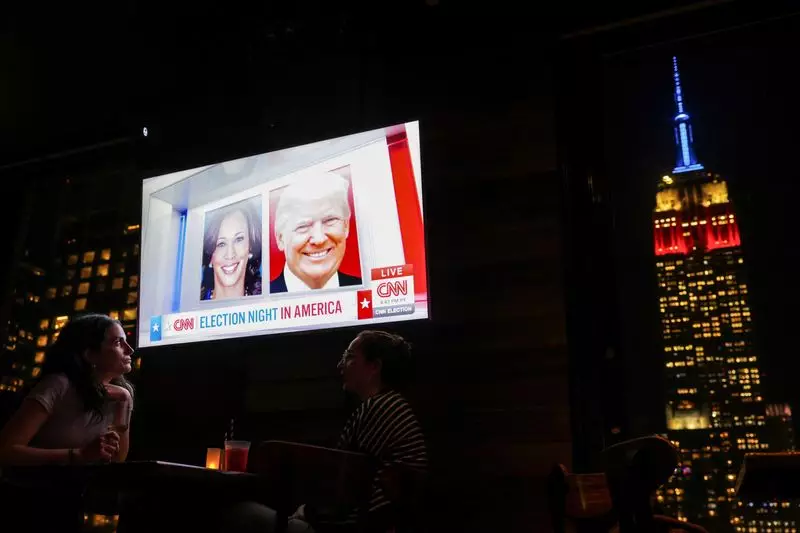The current U.S. presidential election cycle has generated a whirlwind of reactions in the financial markets, reflecting the unease and speculation that surround such pivotal events. As investors grappled with the implications of the narrowing presidential race, the movements in stock futures and currency values revealed a potent cocktail of anxiety and opportunism.
On Wednesday, early results from numerous states indicated an exploratory path filled with uncertainty. The electoral tallies showed Republican Donald Trump capturing key states like Indiana and Kentucky, while Democrat Kamala Harris secured Vermont. These initial results have drawn significant attention, suggesting that the election’s outcome is still largely undetermined. Such uncertainty has a direct impact on investor confidence; market participants often resort to knee-jerk reactions as they attempt to gauge potential policy changes and their economic consequences.
Analysts noted that as results trickled in, predictable market behaviors emerged. For instance, U.S. Treasury yields exhibited an increase, reflecting a shift in sentiment following new information. The movement in yields appeared emblematic of traders recalibrating their expectations. As confidence wavered, so did the metrics that traditionally guide investments. For instance, the yield on 10-year Treasury notes ascended from 4.28% to 4.34%, nearing a four-month peak. Such changes indicate a complex interplay between monetary policy speculation and election results.
Investment experts have identified what they referred to as the “Trump trade,” a concept referring to the financial maneuvers reminiscent of Trump’s prior electoral campaigns. As election developments unfolded, commodities and currency markets reacted acutely. With economic observers attributing a potential rise in inflation to Trump’s policies around immigration and tariffs, financial securities fluctuated accordingly. Brian Jacobsen, chief economist at Annex Wealth Management, aptly summarized the situation as yielding “little conviction” amid the volatility. Investors appeared to be tepid, taking cautious steps rather than making bold commitments.
In the midst of this uncertainty, the dollar index added 0.6% to reach 103.98. The euro, facing headwinds from the dollar’s strength, slipped to $1.0867, reflecting the direct impact on international exchange rates. Increased bond yields also translated to downward pressures on precious metals, with gold prices dipping to $2,738 per ounce, retreating from a record high of $2,790.15.
The influence of U.S. elections transcends borders; it reverberates throughout the global market, notably in Asian markets where fluctuations were evident. The MSCI’s broadest index of Asia-Pacific shares outside Japan remained relatively stable, but Japan’s Nikkei index rose by 1.1% in track with Wall Street’s prior rally. This juxtaposition of stability in Asian markets alongside volatility in the U.S. paints a picture of interconnected financial ecosystems reacting to a singular catalyst: the uncertainty of the U.S. elections.
The situation remained precarious for commodities. Oil prices were also impacted, with U.S. crude declining slightly as traders remained cautious, balancing the potential for supply disruptions from weather events against the uncertain election landscape. This indecisiveness demonstrates how external events can polarize optimistic and pessimistic outlooks among traders.
As investors navigate this tumultuous period surrounding the U.S. election, the reactions across various markets underscore a complex web of emotions and economic fundamentals. With early results suggesting a tight race, the resulting volatility has sparked a classic dilemma — the quest for not just profit, but stability amidst chaos.
The overarching narrative remains that uncertainty leads to cautious trading behavior, as markets react not only to the outcomes of elections but also to the anticipated policy shifts they may usher in. As the election progresses, observers will need to stay attuned to these developments, as they will undoubtedly continue to shape financial strategies and impacts on global markets for the foreseeable future.

